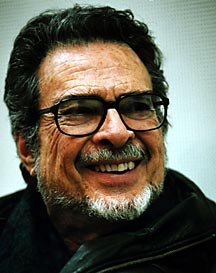Leon Fleisher: Half Pianism, Half Legacy
 The centerpiece of the Shriver Hall piano celebration was the Saturday evening concert of Leon Fleisher, the last of the first great generation of American pianists to still (more specifically: again) possess the skill and artistic integrity to offer an intriguing piano recital. When he divulged that he would do something for the very first time in his more than half-a-century-long stage career, ears perked. That ‘first’ turned out to be more cute than dramatic: he did not want to break with the venerable encore tradition – but since anything after the transcendental Schubert B-flat sonata, D960, would only trivialize the experience, he would – “I am not trying to be presumptuous,” he coyly wedged into that announcement – play the encore first. The enthusiastic crowd was all for that – and Bach’s Sheep May Safely Graze started to emit from the Steinway grand.
The centerpiece of the Shriver Hall piano celebration was the Saturday evening concert of Leon Fleisher, the last of the first great generation of American pianists to still (more specifically: again) possess the skill and artistic integrity to offer an intriguing piano recital. When he divulged that he would do something for the very first time in his more than half-a-century-long stage career, ears perked. That ‘first’ turned out to be more cute than dramatic: he did not want to break with the venerable encore tradition – but since anything after the transcendental Schubert B-flat sonata, D960, would only trivialize the experience, he would – “I am not trying to be presumptuous,” he coyly wedged into that announcement – play the encore first. The enthusiastic crowd was all for that – and Bach’s Sheep May Safely Graze started to emit from the Steinway grand.
Leon Fleisher’s story has been much reported on; the last ivory-Mohican (with William Kapell, Byron Janis, Van Cliburn, and northern cousin Glenn Gould either dead or no longer performing in any meaningful way) and his return to active duty are gladly pressed to the bosom of musical America. That he is a hero in Baltimore is out of question, and he can count on the support of the many, many students his great, ongoing teaching career has spawned. Thus playing a home game, his program proper started with the Bach Capriccio in B-flat (the key the recital would end in; although that’s the only thing that Bach’s “On the Departure of His Most Beloved Brother” has in common with the Schubert sonata). Not rich in color but with double servings of feeling and musicality, this was a moving, logical, sensible affair. Stravinsky’s Serenade for Piano in A major (Stravinsky dedicated this 1925 composition to his wife) got a dreamy, soft rendering, making it even more noticeably a serenade. It may not be a great work, but it can delight as it did here or as it does on Alex Lubimov’s wonderful “Messe Noire” album (reviewed here).
Schubert D960 loomed after the intermission. Although Fleisher's recent, best-selling recital disc Two Hands contained it and much praise was heaped unto it (the disc in general, but also the sonata), I thought that even there the performance of the challenging, grand Schubert sonata raised questions. So did this performance. Mostly: why does Mr. Fleisher still play it? Expressiveness in spades may just not be enough for this work; there are other works – including Schubert sonatas (as Alfred Brendel, who seems more in tune with his limitations and strengths, showed during his recent recital) - that might be more appropriate. Hesitantly (or contemplatively) Fleischer went about it, finally touching the opening notes. And it was transcendental from the first notes on – in a premeditated way. The playing sounded as if Leon Fleisher’s emotional impression of this work (it being transcendental) did not grow out of the music itself, discovering its greatness anew by playing it – but already saturated every note before the sonata could earn itself that status.
Shriver Hall Piano Celebration: Malcolm Bilson (April 9, 2006) Shriver Hall Piano Celebration: Krystian Zimerman (April 8, 2006) Marin Alsop / Leon Fleisher / BSO (January 13, 2006) |
For the audience before which he played, he could not have done wrong – and even if the finale had its painful moments, the crowd was shouting, rooting, applauding, whistling in excitement. No wonder he gave an encore: those ‘grazing sheep’ from two hours earlier.




















































